Unit 1 Section B 2a-2d导学案
人教版八年级上册英语导学案Unit 1:Section B2 (2a-2e)

Unit 1 Where did you go on vacation?Section B 2 (2a-2e)【学习目标】1.理解并掌握下列词汇及短语:enjoyable, activity, decide, try, feel like, bicycle, building, wonder, trader, difference, top, wait, umbrella, wet, because of, below, enough, hungry, as, hill,2. 理解并掌握下列重点句子:I arrived in Penang in Malaysia this morning with my family.We decided to go to the beach near our hotel.I felt like I was a bird.I wonder what life was like here in the past.We waited over an hour for the train.Because of the bad weather, we couldn’t see anything below.3. 了解Jane的假期经历,培养阅读技能。
4. 通过对文章的学习,了解马来西亚槟城山和海墘街,增进对其他国家的了解。
能够合理安排假期生活,让你的假期生活更加有意义。
【重点和难点】1) 知识点。
2)为学写英文旅游日记做准备。
【课前预习】课前预习一、词汇识记活动________ 决定;选定________ 尝试;努力________商人________ 想知道;琢磨________ 差别;差异________等候;等待________ 伞;雨伞________ 足够的;充分的________饥饿的________二、你能用英语写出下列短语吗?1) 到达________________ 2) 今天早晨_______________ 3)决定做某事________________ 4) 感觉像________________5)骑自行车去…_____________ 6) 在过去_______________7) 喜欢做某事_____________ 8) 开始做某事______________ 9) 等待… __________________ 10) 雨下的真的很大______________ 11) 因为… _________________【合作探究】探究一篇章理解1. Fast readingWhat do you think of the trip of each diary?The first dairy: The ________ trip in Penang.The second dairy: The _________ trip in Penang.2. Careful reading完成2c。
Unit 1section B导学案

A. to make; of B. making; of C. to be made; in D. of making; in
【2012曲靖中考】Every morning I _______________(整理床铺) and clean the living room.
4.I don’thave a partnerto practiceEnglish with.
【解析】动词不定式作定语
1.当不定式与所修饰的词有逻辑上的动宾关系时,不定式动词应具有及物性。
2.I don’t knowhowto increasemy reading speed.
【解析】“疑问词+动词不定式”作宾语
注:what to do后不需要跟宾语how to do后必须跟宾语
【拓展】“疑问词+动词不定式”结构:
know(知道),tell(告诉) wonder(想知道)ask(问) find out (发现) learn (学会)
spoken English英语口语written English书面英语
speaking skills口语技巧an English-speaking country一个说英语的国家
【记】He wants to improve his __________ English, by ________English with native ____________.(speak)
whether or not________ _____________________________________________________
新人教版七年级英语下册《Unit1Section B1a—2a》导学案.doc

新人教版七年级英语下册《Unit1Section B1a—2a》导学案课题Unit1SectionB1a—2a 主备人班级七年时间学习目标1.能够熟练读出,书写本节课有关乐器的单词。
2.学会询问某人能力的句型。
重点难点学会谈论自己或别人的能力。
学习过程一、自主学习1、写出下列单词并展示。
鼓_________ 敲鼓____________________钢琴__________ 弹钢琴_______________________小提琴____________拉小提琴___________也;而________________2、完成第4页1a 将单词与图画匹配。
二、合作探究(一)学会询问他人的能力句型。
---- Can you play the guitar?---- Yes,I can. But I can't play the piano.1.两人一组,练习对话。
2.利用1a中的乐器,做替换练习。
三、听力技能提高,完成1b、1d、1e部分,核对答案.四、阅读2a,并能运用所学语言对自己进行描述。
【课堂练习】翻译出下列短语:1.打篮球________________2.打棒球_____________3.踢足球_____________4.弹钢琴________________5.弹吉他_____________6.敲鼓_______________.【检测过关】(教师寄语:Never do things by halves)一、单项选择。
( ) 1.Bob can play ______tennis but can't play ______ violin.A.the, the B.×, × C.the, × D.× , the ( )2. – _______ Mary and Jill play piano this afternoon ?–Yes, they _______.A. Do ; areB. Can ; canC. Do;doesD. Does ; do ( )3.----- ____________ are these bananas?----They are 10 yuan .A. What manyB. What muchC. How muchD. How many ( )4. I like __________ club.A. musicB. music'sC. the musicD. musics( )5. _________ do you want to join?A. How clubB. What clubC. When clubD. Where club ( )6. He _________ to join the music club.A. don't wantB. don't wantsC. doesn't wantD. doesn't wants二、句型转换。
Unit1SectionB2a导学案

一、单选
1.Her sister c an play ______ piano,but she can't play ______ basketball.
A.the;the B./;the C.the;/ D./;/
2.Tom helps his parents ______ the housework.A.with B.in C.at D.on
1.A.is B.amC.are D.be
2.A.can B.can'tC.doesn't D.isn't
3.A.the B.aC.an D.∕
4.A.likeB.wantC.can D.love
5.A.John B.hisC.Jane D.Jane's
4.people意为“人们”,是一个集合名词。它在形式上是单数,但在意义上表示复数,作主语时,谓语动词用复数;表示一个人时用a person.
许多人喜欢住在城市中。Many people ______(like)living in the city.
课堂达标
1、Ann often helps me ____ math after school. A.for B.with C.on D.by
5.—Can Peter ______ Chinese?—Yes,but only a little.
A.speak B.tell C.talk D.say
6.Lisa wants to ______ us her new pictures.A.show B.take C.draw D.teach
7.Miss Read is good ____ __ music .She can be good ______ children in the music club.
初中英语人教版八年级上册Unit1SectionB(2b—2d)优秀教学案例
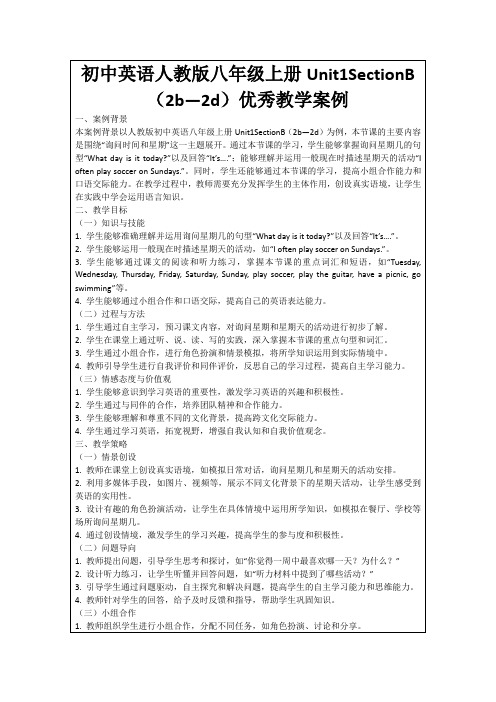
(一)知识与技能
1.学生能够准确理解并运用询问星期几的句型“What day is it today?”以及回答“It’s….”。
2.学生能够运用一般现在时描述星期天的活动,如“I often play soccer on Sundays.”。
3.学生能够通过课文的阅读和听力练习,掌握本节课的重点词汇和短语,如“Tuesday, Wednesday, Thursday, Friday, Saturday, Sunday, play soccer, play the guitar, have a picnic, go swimming”等。
3.教师根据学生的表现和反馈,给予及时的评价和指导,帮助学生提高自我认知和自我调整能力。
4.鼓励学生积极参与课堂活动,培养积极的学习态度和价值观。
四、教学内容与过程
(一)导入新课
1.教师以一幅描绘一周活动的图片或视频作为导入,激发学生的兴趣,引导学生思考和讨论。
2.提出问题,如“你们觉得一周中最喜欢哪一天?为什么?”让学生发表自己的观点和经历。
2.针对学生的回答和表现,教师进行总结和归纳,强调本节课的重点句型、词汇和短语。
3.通过问答和互动,巩固学生对星期和星期天活动的理解和运用。
(五)作业小结
1.教师布置相关的作业,如填空练习、写作任务等,让学生巩固所学知识。
2.强调作业的重要性,鼓励学生认真完成并按时提交。
3.提醒学生在完成作业的过程中,遇到问题时可以寻求帮助,培养自主学习的能力。
3.小组合作:教师组织了学生进行小组合作,培养了学生的团队精神和沟通能力。在小组合作中,学生相互交流和合作,共同完成任务,提高了彼此的学习效果。
4.反思与评价:教师引导学生进行自我评价和同伴评价,帮助学生提高自我认知和自我调整能力。通过反思与评价,学生能够更好地了解自己的学习情况,找到不足并加以改进。
人教版八年级英语上册Unit1SectionB 2a--2d教学设计

年级
八年级
科目
英语
任课教师
;李波
编号:5
授课时间
9月11日
课题
Unit 1 Where did you go on vacation?
Section B 2a-2e
A:20. ______________________
B:It was delicious. I love Japanese food!
七、作业设计
一、用所给动词的适当形式填空。
1.My mother ______ (buy) a new schoolbag for me yesterday.
2.When _____ you _____ (start) to learn English?
5.They _______ (have) a great sale last weekend.
3. Ss read carefully and try to write down the words in the blanks.
4. Check the answers with the class.
Work on 2e:
1.告诉学生们这篇日记是Jane在七月十八日又一次参观了Penang Hill后,所写的。读日记,并用括号中单词的正确形式填空。
What do people usually do on vacation?
What activities do you find enjoyable?
2. Give Ss some possible answers:
人教版九年级英语Unit1 Section B(2a~2e)教案
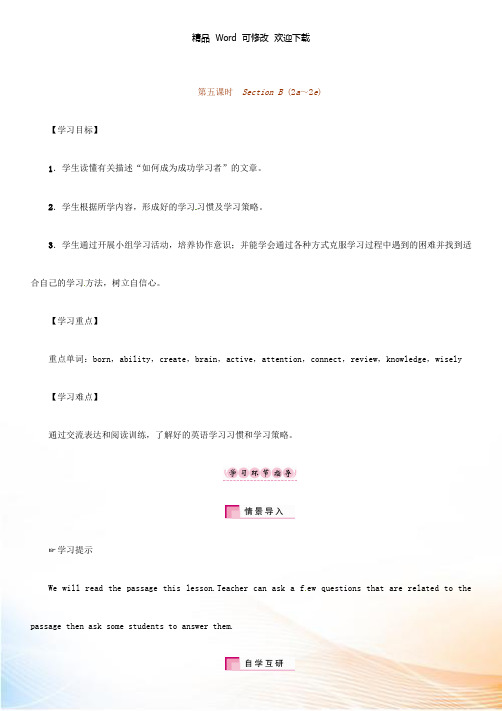
第五课时Section B (2a~2e)【学习目标】1.学生读懂有关描述“如何成为成功学习者”的文章。
2.学生根据所学内容,形成好的学习习惯及学习策略。
3.学生通过开展小组学习活动,培养协作意识;并能学会通过各种方式克服学习过程中遇到的困难并找到适合自己的学习方法,树立自信心。
【学习重点】重点单词:born,ability,create,brain,active,attention,connect,review,knowledge,wisely 【学习难点】通过交流表达和阅读训练,了解好的英语学习习惯和学习策略。
☞学习提示We will read the passage this lesson.Teacher can ask a f ew questions that are related to the passage then ask some students to answer them.Task 1☞学习提示Learn and research the text before class:students read the passage quickly in silence in 2b.Mark the new words,key phrases and sentences.【学法指导】►even ifeven if意为“即使”,引导让步状语从句,相当于even though。
►be (not) afraid of doing sth.意为“(不)害怕做某事”,表示内心不情愿做某事,担心某事可能会发生。
be afraid to do sth.意为“害怕做某事”,强调因心里畏惧而不敢去做某事。
Task 2☞学习提示1.Fast reading(1)Students read the passage quickly to know the main idea and finish the tasks in 2b.情景导入生成问题1.What good habits can you think of?________________________________________________________________________2.Do you know how you can become a successful learner?________________________________________________________________________自学互研生成能力Task 1Let's read new words and the phrases.1.I can read.(我会读)预习下列单词,争取自己能正确拼读。
人教版英语八年级上册 Unit 1 Section B(导学案)
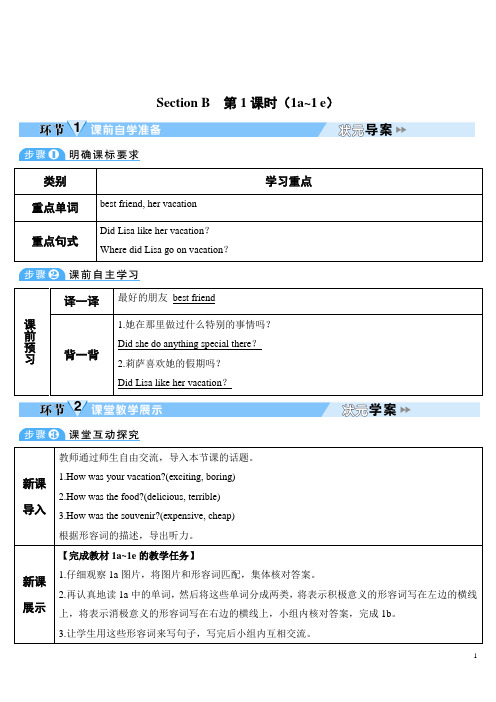
Section B 第1课时(1a~1e)类别学习重点重点单词best friend, her vacation重点句式Did Lisa like her vacation?Where did Lisa go on vacation?课前预习译一译最好的朋友best friend背一背1.她在那里做过什么特别的事情吗?Did she do anything special there?2.莉萨喜欢她的假期吗?Did Lisa like her vacation?新课导入教师通过师生自由交流,导入本节课的话题。
1.How was your vacation?(exciting, boring)2.How was the food?(delicious, terrible)3.How was the souvenir?(expensive, cheap)根据形容词的描述,导出听力。
新课展示【完成教材1a~1e的教学任务】1.仔细观察1a图片,将图片和形容词匹配,集体核对答案。
2.再认真地读1a中的单词,然后将这些单词分成两类,将表示积极意义的形容词写在左边的横线上,将表示消极意义的形容词写在右边的横线上,小组内核对答案,完成1b。
3.让学生用这些形容词来写句子,写完后小组内互相交流。
4.学生听1c的录音,回答问题。
5.让学生再听一遍,完成1d的填空任务。
6.核对答案。
(单独提问与集体回答相结合)。
7.跟读录音,纠正语音语调。
8.教师让学生根据1c中提供的信息谈论Lisa的假期。
(可用where, what, how等问题来谈论)。
【语法提要】cheap与inexpensive二者都表示“便宜的”。
cheap往往意为质量差,指价钱便宜的或因质量差而价格低的。
inexpensive 指物美价廉的,价值与价格相比而便宜,表示“价格公道的;不贵的”。
例句:The clothes in the shop are very cheap.这个商店的衣服非常便宜。
新人教版九年级英语上册Unit 1 Section B 2a—2e 导学案

Unit 1 How can we become good learners?Section B 2a—2e 导学案Ⅰ. 单词检查 1.出生;天生的__________ 2.能力;才能__________ 3.创造;创建__________ 4.大脑__________ 5.活跃的;积极的__________ 6.注意;关注__________ 7.连接;与……有联系__________ 8.一夜之间____________ 9.回顾;复习__________ 10.知识;学问_______________ 11.终身的;毕生的__________ 12.明智地;聪明的__________Ⅱ. 短语记忆 1. be born with _________________ 2. whether or not _________________3. depend on _________________4. learning habits _________________5. in common _________________6. pay attention to _________________7. connect…with…_________________8. be good at _________________9. even if_________________ 10. find out _________________11. draw mind maps _________________ 12. each other _________________13. a part of _________________【合作探究】探究1.be born with“生而具有”;常指生来就具有某种天分、性格或患有某种疾病等。
be born“出生,出世”,为被动语态,当说明某(些)人的出生情况时,be动词常用was/were She was born with weak eyesight. 她天生视力差。
人教新目标英语八年级上册Unit1 Section B(2a-2b)导学案(无答案)

人教新目标英语八年级上册Unit 1 Where did you go on vacationSection B(2a----2b)导学案课前预习单主备人:预习指导1.朗读本课时单词,仔细观察单词中各字母的发音特点并记忆。
2.阅读2b的两篇日记,找出不懂的或者你认为难理解的词句,并做好标记。
3. 模仿这两篇日记范文试描写或谈论自己的假期。
一汉译英:1.到达___________________2.决定做……___________________3.去海滩___________________4.试着做……___________________5.尽力做……___________________6.好像……/觉得……___________________7.骑自行车去……___________________8.大量的/许多的_____________9.100年前__________________ 10.喜欢做某事______________11.走上……_________ 12.等待…____________13.因为…_________________ 二翻译下列句子1 我们决定去酒店附近的沙滩。
_______________________________________2 我感觉我好像是一只鸟。
__________________________________3 那儿现在有许多新的建筑,但仍然还有一些旧的建筑。
________________________________________________4 我想想过去这的生活如何。
_____________________________________5 一天的差异是多大呀!_________________________________________6 并且因为糟糕的天气,底下的东西我们什么都看不到。
________________________________________________________-课后拓展训练单一选择填空( )1. —How ________you ________your summer vacation? —I visited Xi’an.A. do,spendB. did,spendC. did,spent ( )2.________did you go on vacation?A. WhereB. WhatC. Who ( )3. There ________a small boy ________in the comer,and I helped him find his mother.A. was,cryingB. is,cryC. was,cries ( )4. Can you help me ________a taxi?A. lookB. giveC. find ( )5. Do you want ________the music club?A. joinB. joiningC. to join ( )6. I found a little cat ________with a ball in the garden.A. playsB. playedC. playing ( )7. What did they decide ________then?A. doB. to doC. doing ( )8. We had great fun ________in the water.A. playB. playedC. playing ( )9. That computer was too expensive,________I decided not to buy.A. becauseB. soC. if( )10. I didn’t have ________money for a taxi,________I have to walk home.A. many,becauseB. any,soC. some,so 二句型转换1. Don’t come late to school. (改为同意句)Don’t ________late ________school.2. What is your father? (改为同意句)What ________your father ________.3. They went to do some shopping yesterday afternoon. (改为同意句) They ________ ________ yesterday afternoon.4. They wanted to go to Africa on vacation. (改为否定句)They ________ _______to go to Africa on vacation.5. We had some hamburgers and fruit for lunch. (对画线部分提问)________did you ________for lunch?arrive in 和arrive at 的异同:_________________________________ try to do 和try doing的异同:______________________________ because 和because of的异同:_______________________________feel like 后接句子也可以接动词,接动词用什么形式?________________________________________________________。
Unit1 Section B 2a-2d Reading教案人教版八年级下册英语
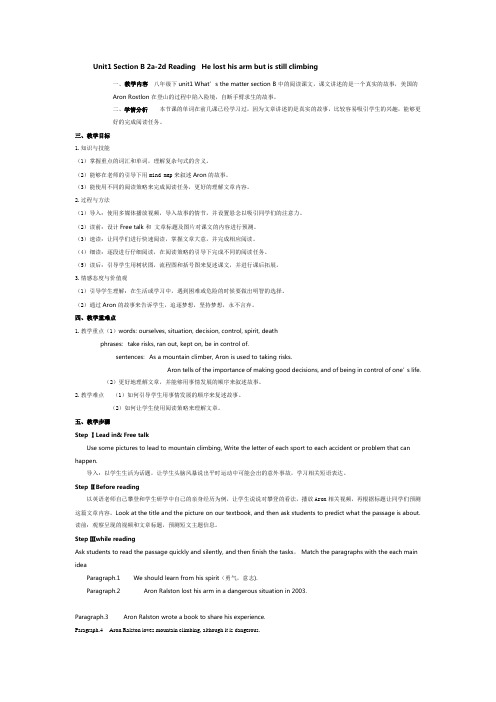
Unit1 Section B 2a-2d Reading He lost his arm but is still climbing一、教学内容八年级下unit1 What’s the matter section B 中的阅读课文,课文讲述的是一个真实的故事,美国的Aron Rostlon 在登山的过程中陷入险境,自断手臂求生的故事。
二、学情分析本节课的单词在前几课已经学习过,因为文章讲述的是真实的故事,比较容易吸引学生的兴趣,能够更好的完成阅读任务。
三、教学目标1.知识与技能(1)掌握重点的词汇和单词,理解复杂句式的含义。
(2)能够在老师的引导下用mind map来叙述Aron的故事。
(3)能使用不同的阅读策略来完成阅读任务,更好的理解文章内容。
2.过程与方法(1)导入:使用多媒体播放视频,导入故事的情节,并设置悬念以吸引同学们的注意力。
(2)读前:设计Free talk 和文章标题及图片对课文的内容进行预测。
(3)速读:让同学们进行快速阅读,掌握文章大意,并完成相应阅读。
(4)细读:逐段进行仔细阅读,在阅读策略的引导下完成不同的阅读任务。
(5)读后:引导学生用树状图,流程图和括号图来复述课文,并进行课后拓展。
3.情感态度与价值观(1)引导学生理解:在生活或学习中,遇到困难或危险的时候要做出明智的选择。
(2)通过Aron的故事来告诉学生,追逐梦想,坚持梦想,永不言弃。
四、教学重难点1.教学重点(1)words: ourselves, situation, decision, control, spirit, deathphrases: take risks, ran out, kept on, be in control of.sentences: As a mountain climber, Aron is used to taking risks.Aron tells of the importance of making good decisions, and of being in control of one’s life.(2)更好地理解文章,并能够用事情发展的顺序来叙述故事。
初中英语人教版八年级上册Unit 1Section B 导学案-精选文档

Example:In the morning, Jane and her family wenttothe beach.
She ______________.
It was ….
In the afternoon, ....
Task3: Read again and match the results with the reasons(因果连线).
其实,任何一门学科都离不开死记硬背,关键是记忆有技巧,“死记”之后会“活用”。不记住那些基础知识,怎么会向高层次进军?尤其是语文学科涉猎的范围很广,要真正提高学生的写作水平,单靠分析文章的写作技巧是远远不够的,必须从基础知识抓起,每天挤一点时间让学生“死记”名篇佳句、名言警句,以及丰富的词语、新颖的材料等。这样,就会在有限的时间、空间里给学生的脑海里注入无限的内容。日积月累,积少成多,从而收到水滴石穿,绳锯木断的功效。(根据时间轴复述Jane的星期一的经历)
人教版英语 八年级上册 Unit1 Section B 2a-2d 电子教案
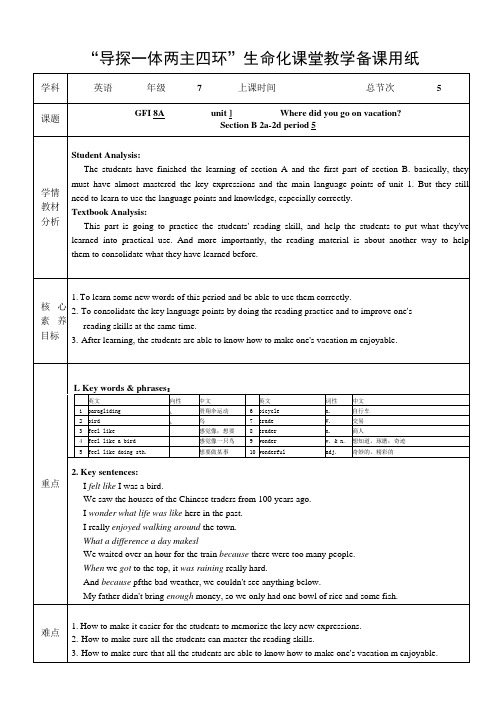
“导探一体两主四环”生命化课堂教学备课用纸Read the dictating words, phrases and sentences for the students.Try to write down the dictating words,phrases or sentences all correctly.败州in祢H I diaryL02I decide U io 血2 actirity L 上::Me 出网即 on uulia?3 actin 讥j 1 itnt ti kf Tod City. &打4 act r.9 Did yoi hiy urthint s^eciil?5心L10 Tes, I b:u (kt j (attiii ( for tj fitbtr.盼梆施Hii.Give the students one to two minutes to check one's dictation.Show the students a video about paragliding and ask: > What kind of activity is it? > Have you ever tried paragliding? >If yes, how do you feel?Jane tried paragliding on her vacation, how did she feel?Present the students more questions:1. How was the weather on Monday?2. When did they go to the beach?3. What did Jane have for lunch?4. How did they get to Georgetown?5 Was her trip in Georgetown?Give the students several minutes to get more familiar with the diary entry.Ask the students to read the second diary entry.Write the expressions one made mistakes on three times on one's craft book./ It's paragliding. / Yes./No.Scan the first diary entry and find out the answer to the questions. Read the first diary entry quickly and compete to answer the questions.Read the first diary entry after the tape aloud.Read the second diary entry and do the same practice the the first one.板 书 设 计Maria gets something from Jane's diary entries:教学准备1. Teaching plan2. PPT3. Pads4. Survey paper 教学内容> Io make one's vacation more enjoyable, we need to be well prepared. > No matter it is good or bad.it can be life experiences and experience.教师活动学生活动1. Warm-up:Dictation [6min]2. Presentation: Before reading Lead in[2min]3. Practice: While reading 2b:Fast reading Scanning the first diary entry 【l+5min 】Read aloud [3min] Scanning the second diary entry[8min]教学过程教学内容教师活动学生活动2c: careful reading[8min]4. Promotion:2d: a quiz[6min]Group work[5min]Feedback[Imin]Have the students read Jane's diaryentries again.Send the students the quiz paper totheir pads.Setting:You f re going to interview Janeabout her vacation in Penang inMalaysia and write an article for theschool newspaper.After preparation, present one's workin class.Q: What do you learn from the twodiary entries?T: Maria gets something from Jane'sdiary entries:◊To make one's vacation moreenjoyable, we need to be wellprepared.◊No matter it is good or bad, it canbe life experiences andexperience.Read the diary entries again carefullyand fill the chart.2c Read Jones diary entries again. Fill in the chart.Things Jane did or saw Did she like it? (Yes/No) Why or why not?tried paraghdingThey were defcefous.wafced around Georgetownwtnt to Penang HidIt tasted great because shewas hungry.Finish the test within 5 minutes. Andrevise one's answers,. Complete the conversation about Janes trip to Penang using the 、information in the diary entries. \Anna: Hi v Janc. Where did you go on vacation week?1 ______ to Penang in _______ .Anm: Who you go with?Jone: 1 went with my _ •Anna; What did you do?Jane: The weather was hot and on Monday, so we went onthe beach. Then in the afternoon, we bicycles to GeorgetownAnal: Sounds great1Jane Well, but the next day was not is good. My And 1 went toPenang 1 UU r but the wcMhcr really Kid And r^iny. Wc _a long time for the train and we were and cold because weforgot to bring an 一.Ama: Oh, no!Mur And that < not all! We also didn't bring _ money, »o wc cmly had /one bowl of rice and some fish. /one student role play as Jane and other1 〜2 students role play as thereporter(s).information includes:Where did you go on vacation?Who did you go with ?What did you do there?How was the weather there?How about the food?What did you think about your vacation ?Do you want to go there again?• • •。
【人教版】七下英语Unit1(Section B 2a—2b self check)导学案

课题: Unit1 SectionB 2a—2b self check 课型:新课课时:一课时主备人:李飞燕学习目标:1 学会运用情态动词can谈论自己的喜好和意愿。
2能运用情态动词can谈论自己在某一方面所具备的才能。
3 能够表达自己加入某个社团的想法和理由,培养团队精神。
重、难点:情态动词的运用并学会些招聘海报。
独学准备: 1.试做3a和3b,完成随堂笔记一;当堂测评分层达标基础落实★提升素养★★★一.用too,also填空。
1. 1 I can ____play soccer.2 Mary can play the violin,____.二.你区分be good at,be good with和be good for的意思了吗?1 Bob is good______old people.2 Are you good __________swimming?3 Vegetables are good _________our health.三.单项选择。
1 _Are you good ______kids?Yes, kids like playing with me.A.at B for C with D in2.Tom can dance,and I can _____dance.A alsoB tooC soD either4.发展能力★★四.完形填空Most children like _1_TV.On TV they can learn __2_ knowledge(知识),and they can see and know many things __3__ their country and the world.Of course,they can __4__ to the radio,but they can learn better and more easily by __5__.Why?Because they can __6__ and watch at the same time.But they can’t see anything over the radio. Many children watch TV __7__ Saturday or Sunday evening.They are very busy __8__ their lessons on weekdays.But a few children watch TV every __9__. They go to bed very late.So they cant have a good _10_.How about you,my young friend? ( )1. A.watch B.to watching C.watching D.watches ( )2. A. a lot B. a lot of C.lot of D. a lots of ( )3. A.to B.about C.at D.with ( )4. A.sing B.learn C.listening D.listen ( )5. A.radio B.game C.TV D.email( )6. A.listen B.like C.see D.watching ( )7. A.in B.on C.to D.for ( )8. A.before B. on C.about D.with ( )9. A.place B.time C.night D.morning ( ) 10. A.time B.rest C.meal. D. place。
人教版英语八年级上册 Unit1 SectionB(2a-2e)精品导学案

Unit1 SectionB(2a-2e)精品导学案知识目标1. 口、笔头掌握以下句型I arrived in Penang in Malaysia this morning with my family.We decided to go to the beach near our hotel.I felt like I was a bird.I wonder what life was like here in the past.It started raining a little.We waited over an hour for the train.Because of the the bad weather, we couldn’t see anything below.2. 熟练掌握以下词汇:activity, decide, try, feel like, bicycle, building, wonder, trader, difference, top, wait, umbrella, wet, because of, below, enough, hungry, as, hill技能目标:能读懂描述体验生活经历的文章,并能运用相关知识写出自己或他人的经历。
情感态度: 培养学生面临问题时能够解决问题的能力和积极的生活态度。
1.你能从2b中找出下列短语吗?1) 到达________________ 2) 今天早晨________________3) 决定做某事________________ 4) 感觉像________________5) 骑自行车去…________________ 6) 在过去________________7) 喜欢做某事________________ 8) 开始做某事________________9) 等待… ________________ 10) 雨下的真地很大________________ 11) 因为… ________________II. Pair work: 1. What do people usually do on vacation?2. What activities do you find enjoyable?Before reading1.小组之间核对课前准备I。
人教版七年级英语下册 Unit 1 Section B (2a-2d)教案

Learn to describe your abilities
Learn to choose characters according to their abilities
Read about the ad, poster, etc
(Play the recorder, and check the answers. Ask students to listen to the recording and learn to talk about joining the club.)
T: Some students want to join the club. Look at the conversation in Activity 2b. Fill in the blanks. Then ask them to listen to the recording and check the answers.
1. Ask students to do Activities in the Workbook.
2. Ask students to help their classmates to join the club.
3. Finish off all the exercises on the screen.
②认读词汇
sing, join, or, kung fu, piano, center
③词组
join the music club, very well,play chess, speak English, play the guitar, play ... well, be good at, be good with, help with, play the drums, play the piano, sing or dance, learn about, call sb. at…
unit 1 Section B 2a-2e导学案
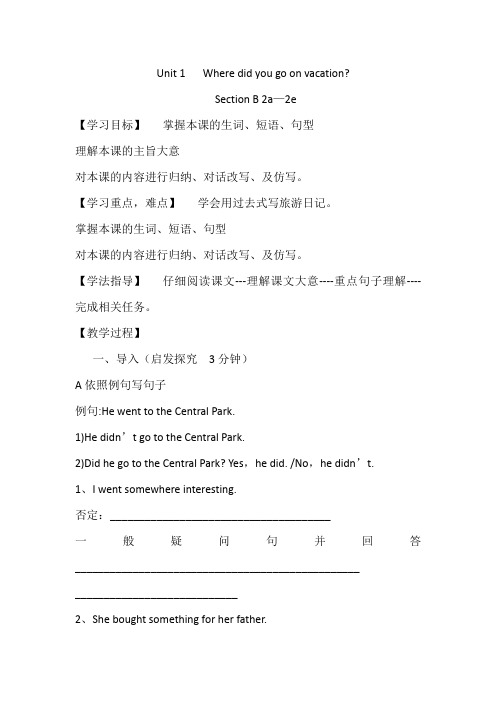
Unit 1 Where did you go on vacation?Section B 2a—2e【学习目标】掌握本课的生词、短语、句型理解本课的主旨大意对本课的内容进行归纳、对话改写、及仿写。
【学习重点,难点】学会用过去式写旅游日记。
掌握本课的生词、短语、句型对本课的内容进行归纳、对话改写、及仿写。
【学法指导】仔细阅读课文---理解课文大意----重点句子理解----完成相关任务。
【教学过程】一、导入(启发探究3分钟)A依照例句写句子例句:He went to the Central Park.1)He didn’t go to the Central Park.2)Did he go to the Central Park? Yes,he did. /No,he didn’t.1、I went somewhere interesting.否定:______________________________________一般疑问句并回答_____________________________________________________________________________2、She bought something for her father.否定:______________________________________一般疑问句并回答_____________________________________________________________________________3、We fed some hens and saw some baby pigs.否定:______________________________________一般疑问句并回答_____________________________________________________________________________4、He took a bag with food and water.否定:______________________________________一般疑问句并回答_____________________________________________________________________________5、They forgot about the last five hours.否定:______________________________________一般疑问句并回答_____________________________________________________________________________B discussingWhat do people usually do on vacation?What activities do you find enjoyable?二、自学(自主探究6分钟)Task1:听2b磁带,体会语音、语调、句群停顿,理解段落的汉语意义。
Unit1SectionB(2a-2c)导学案- 人教版七年级英语上册
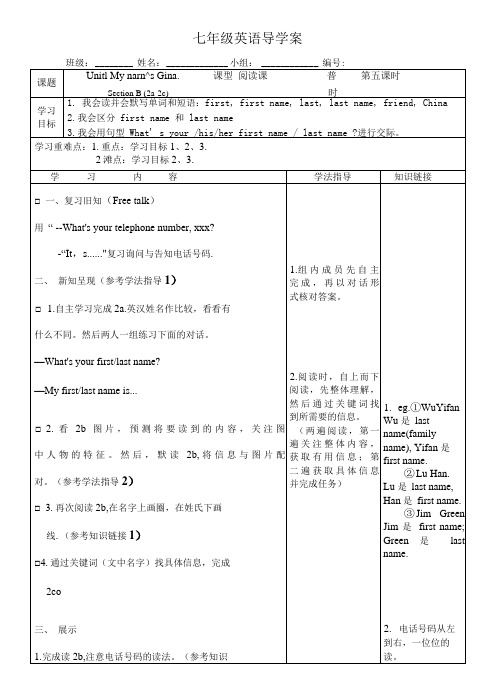
A. How are you? B. What's you name?
C.What's your telephone number?
D.What's your last name?
口二)根据汉语和句意填空.
1.She is my(朋友)・Her name is Gina Smith. Gina is her, Smith is her. He is
-“It,s......"复习询问与告知电话号码.
二、新知呈现(参考学法指导1)
□1.自主学习完成2a.英汉姓名作比较,看看有
什么不同。然后两人一组练习下面的对话。
—What's your first/last name?
—My first/last name is...
□2.看2b图片,预测将要读到的内容,关注图
Brown o
四、达标测评
口 一)单选
1.He is Zhang Ming .His first name is.
A.Zhang B. Ming C. Zhang Ming
2.first name is Susan.
A. He B. She C. Her D. His
3.her name? -Lily.
A.Who's; She B. Who's; Her name
B.What's; She's D. What; Her name is
4.-What's her telephone number? -.
A. She is 9. B. Ifs 027-2806
C.It's her telephone number. D. Her is 0372-81658.
- 1、下载文档前请自行甄别文档内容的完整性,平台不提供额外的编辑、内容补充、找答案等附加服务。
- 2、"仅部分预览"的文档,不可在线预览部分如存在完整性等问题,可反馈申请退款(可完整预览的文档不适用该条件!)。
- 3、如文档侵犯您的权益,请联系客服反馈,我们会尽快为您处理(人工客服工作时间:9:00-18:30)。
Unit 1 How can we become good learners?Section B 2a-2e 导学案一、导入What good learning habits can you thnk of ?Make a list and discuss them with yourpartner.二、自主学习认真阅读文章,找出下列短语1.天生具有__________________2.学习的能力______________________3.是否________________4. 依赖________________5.共同的/普遍的好习惯_____________6.激发...的兴趣_______________________________7.对...感兴趣________________________8.注意,关注_________________________9.把...和...联系起来_________________________ 10.有趣的事_______________________11.向...学习__________________12.使用则进步,不用则荒废_______________________13.即使____________14.熟能生巧_______________________ 15.做笔记________________16.画思维导图_____________________ 17.知识来源于质疑___________________________三、合作探究小组合作学习,完成2b-2d的学习任务。
四、总结1.Everyone is born with the ability to learn.每个人天生具有学习的能力。
(have)the ability to do sth.(有)做某事的能力(1)He was born________ a good memory. A.of B.with C.for(2)She has the__________(able) to keep calm in an emergency.2.But whether or not you can do this well depends on your learning habits但你是否学得好则取决于你的学习习惯。
【解析】depend on 依靠;信赖(1)We’re planning to go for a picnic this weekend , but it ___ the weather.A. keeps onB. puts onC. depends on3.Research shows that successful learners have some good habits in common研究表明,成功的学习者有着某些共同的良好的学习习惯。
【解析1】succeed v成功,达到→success n成功→successful adj成功的→successfully adv成功地◆succeed in doing sth 成功做某事(1.)After hundreds of experiments, Edison _______ (成功) invented the light bulb.(2.)You need hard work and a little luck if you want to achieve _________(successful).(3.)what do you think of that clever boy?He is a very _____(succeed) student, because he is interested in study.(4.)( ) She works very hard ,so she will ____ in ____ the exam.A. successful; passB. success ;passingC. succeed; passingD. successful; passing【解析2】have sth in common 有......共同之处4. It is also easier for you to pay attention to it for a long time. 对你来说也更容易长时间关它。
【解析1】It’s + adj.(easy,difficult,important,necessary) +(for sb.) to do sth【注】若形容词表示事物特征的,如:easy ,difficult, hard等,须用介词for 【形容物,用for】It’s +adj( kind, honest, friendly, )+(of sb) to do sth.【注】若形容词表示人的性格、品质与特点,如:good ,kind ,nice,等,用介词of。
【形容人用of】(1.)It’s very convenient ___ us to buy train tickets now because we can buy them either fromthe station or on the Internet. A. to B. of C. by D. For(2.). It’s very friendly ________ him to help me when I’m in trouble.(选项同上)【解析2】pay attention to 对……注意(3). When you visit a museum you should _______ the instructions and don’t be against them.A. compare withB. look forward toC. pay attention toD. try out5.Good learners often connect what they need to learn with something interesting.优秀的学习者常常将他们需要学习的东西与有趣的事物联系起来。
【解析1】connect ... with 把.....与...... 联系在一起A good student must _____what he reads _______ he sees around him.A. depend onB. connect ,withC. agree ,with6. Even if you learn something well, you will forget it unless you use it.Practice makes perfect.即使是你学得很好的东西,如果你不使用它,你就会忘记它。
“熟能生巧”【解析1】even though=even if 即使引导让步状语从句【注】even though 引导让步状语从句时,不能与but连用(1)____ my father isn’t pleased with his working environment , he still works hard.A. AndB. AlthoughC. ButD. Before(2) —This dress was last year’s style.—I think it still looks perfect ______ it has gone out this year.A. so thatB. as ifC. even thoughD. ever since【解析2】unless= if … not 除非…… ,如果不(引导条件状语从句)(3). They will lose the game _______ they try their best.A. unlessB. onceC. sinceD. After(4) We’re not sure if it ______tomorrow .If it _______,we won’t go hiking.A. will rain ;rainsB. will rain;will rainC. rains;rains【解析3】Practice makes perfect熟能生巧(4). Mr Bridges, my primary school teacher, used to tell us that practice _______ perfect.A. makeB. madeC. makes7. Good learners will keep practicing what they have learned ,and they are also not afraid of making mistakes.优秀的学习者会继续练习他们已经学过的知识,而且他们不害怕犯错误【解析】keep →kept →kept v 留住;保持(1) Although you like the book, you may only ______ it for two weeks.A. borrowB. keepC. lendD. stay.(2)keep +adj. 使保持.. keep healthy=stay healthy 保持健康keep quiet =be quiet 保持安静Some of the tired students keep their eyes _____ in breaks.A. openedB. closeC. closedD. open(3) keep sb. doing sth 使某人一直做某事As we all know, it’s not polite to keep others ____ for a long time.A. waitB. waitedC. to waitD. waiting五、练评--Why do you always go to Lanzhou University on weekends ?--Because there are lots of great speaker I can practice English _____in the English corner there. A. with B. to C. on D. about。
